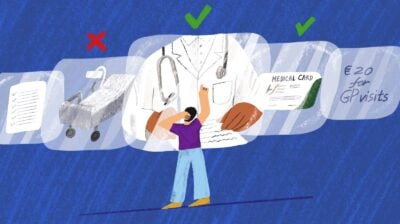What is abortion?
Learn about abortion and who you can talk to if you are considering a termination

Abortion is the termination or ending of a pregnancy before the point of viability, i.e. before the point where a baby might be able to survive outside the womb. It can be a very difficult thing to decide to do, and there are many different reasons why a person might decide to have a termination. There are different abortion procedures and methods used, depending on how long you have been pregnant.
In this article:
- Why would someone have an abortion?
- Can I get an abortion in Ireland?
- What happens during an abortion?
- Post-abortion care
Why would someone have an abortion?
A person might decide to have an abortion for a number of reasons. This is a personal decision for each individual, and they get to decide themselves if a termination is right for them.
Unplanned pregnancy
People generally do not want to become pregnant until they are ready to have a baby. Many people can experience an unplanned pregnancy, for many different reasons. Some decide not to continue with the pregnancy and to have an abortion. Others choose to continue with the pregnancy and choose parenting or adoption.
Fatal foetal anomaly
A fatal foetal anomaly, sometimes referred to as a fatal foetal abnormality, is a condition that can develop while a baby is still in the womb. If a pregnant person receives a diagnosis of fatal foetal anomaly, it means that their baby is not likely to survive the whole pregnancy, or that the baby is likely to die shortly after birth.
Some people might decide to continue with the pregnancy to full term despite this diagnosis. Others will decide to terminate the pregnancy before the full term, rather than continuing with a pregnancy in which they know their baby won’t survive.
Threat to the pregnant person’s life
For some people, becoming pregnant could lead to serious complications for their physical or mental health, and could even threaten their life. For example, a person diagnosed with cancer may not be able to continue with their treatment if they become pregnant.
Can I get an abortion in Ireland?
Abortion is available in Ireland through the HSE. The procedure is free if you live in the Republic of Ireland.
If you live outside the Republic of Ireland, you can still access abortion services here, but you would have to pay for it.
When can I get an abortion in Ireland?
In Ireland, abortion is available if you are no more than 12 weeks pregnant (84 days since the first day of your last period).
If you are more than 12 weeks pregnant, abortion is only available in certain circumstances such as a fatal foetal anomaly, if the pregnancy could cause serious harm to your health, or if the pregnancy puts your life at risk.
Pre-abortion consultation
If you want an abortion, you must visit a doctor for a pre-abortion consultation. This is where you can talk to your doctor about the procedure and get all of the information you need.
At the consultation, the doctor will do a pregnancy test to confirm that you are pregnant, and will certify that you are no more than 12 weeks along. An ultrasound may be necessary to confirm how many weeks along the pregnancy is. If you need to wait for an ultrasound appointment, it could delay the process, and you won’t be able to go ahead with the procedure until you have the results. This is why it’s important to go to your doctor as early as possible so that any potential delays will not bring the pregnancy over the 12 week mark.
You must get this certification that the pregnancy is no more than 12 weeks before you can go ahead with the abortion.
If you attend your appointments with another person, you will have a chance to talk privately with the doctor so that you can give them information confidentially, and so that they can be sure the decision is yours.
3-day wait period
The law requires that there must be a 3 day period between getting certification from your doctor and when the procedure takes place.
This means you will have to wait 3 days after your pre-abortion consultation to get the procedure, so it’s a good idea to go to your doctor as early as possible to avoid delays. It may be a few days before you can get an appointment, so keep this in mind.
For more information on getting an abortion in Ireland, visit the HSE website.
Where can I get an abortion in Ireland?
Abortion services are available through:
- GP surgeries that provide abortion services
- Family planning clinics or women’s health clinics that provide abortion services
- Hospitals that provide abortion services
Not all doctors provide abortion services. If your local GP does not offer this service, you will need to go to a different doctor’s surgery that does.
For information and advice on finding somewhere to access an abortion, contact My Options support service on freephone 1800 828 010.
Click here for a list of hospitals providing abortion services.
Can I get an abortion if I’m under 18?
If you are 16 or 17, you can access abortion services if the GP is confident that you understand the information and you can give valid consent. You don’t need to involve a parent or guardian. Even though you don’t need their permission, it is encouraged to involve a supportive adult if you can to help you through the process.
If you are 15 years or under and choose not to involve an adult, a doctor can offer you an abortion if there are exceptional circumstances and an assessment has been completed. You can talk to your doctor about this if you have any queries.
Will my doctor tell anyone?
Under Irish law and child protection guidelines, the doctor must report to Tusla, The Child and Family Agency, if:
- You are 14 or under and have engaged in sexual activity
- You are 15 or 16 and engaging in sexual activity with someone who is at least 2 years older than you
- You are 17 and under and the doctor suspects that you are at risk of sexual abuse or harm or that you have been sexually abused or harmed
Learn more about medical consent and confidentiality here.
How much does an abortion cost?
Abortion is free if you live in the Republic of Ireland.
If you do not live in the Republic of Ireland, but you want to access abortion services here, you will have to pay for it. You will need to contact the clinic, hospital, or GP surgery directly to find out the cost.
What happens during an abortion?
There are two main methods of abortion – a medical abortion using medication, or a surgical abortion using instruments. The exact procedure depends on the stage of the pregnancy, but usually you will have a choice between a medical abortion or a surgical abortion.
People may choose one over the other for many different reasons, for example the length of time it takes (surgical abortions are much quicker) or the expected experience (for a medical abortion, no anaesthetic is needed and you can stay awake, while for a surgical abortion you will likely be asleep).
Medical abortion
A medical abortion is an abortion caused by medication in the form of pills. It does not involve any surgery and does not need an anaesthetic.
Up to 10 weeks of pregnancy – early medical abortion
An abortion at this stage is safe enough that it can happen with very little medical supervision. It is very similar to an early miscarriage i.e. you will experience cramping pain and heavy bleeding, and you will pass tissue, more than what would pass in a normal period. You will be given the medication by a doctor or nurse (usually in two separate appointments) and then pass the pregnancy at home or wherever you are staying if you are travelling. You may be able to stay in the clinic if you wish. It is recommended that you do not travel until the pregnancy has passed (90% of people will pass the pregnancy within 4 hours of taking the second medication).
Between 10-24 weeks – medical abortion
At this stage, it would be necessary to stay at the clinic after taking the second medication for supervision. This is because the pregnancy is at a later stage, and the medical risks of having an abortion increase as the pregnancy progresses. The medication causes the womb to contract and push out the pregnancy. From 22 weeks an injection to the womb may be required.
Surgical abortion
If you are travelling to have a surgical abortion with general anaesthetic you will need to bring an adult with you so you are not alone when you travel home afterwards.
Vacuum aspiration method up to 14 weeks
Removes the pregnancy by gentle suction. This can be done under local anaesthetic (awake), or under general anaesthetic (asleep). Different clinics may offer different types of anaesthetic. The procedure takes between three and ten minutes.
Dilation and evacuation between 15 weeks – 24 weeks of pregnancy
The pregnancy is removed using narrow forceps through the neck of the womb. Carried out under general anaesthetic (asleep). Treatment undertaken at over 20 weeks may require more than one visit and an overnight stay. The procedure can take up to 30 minutes, but you will need to stay in the clinic under observation for a few hours.
Post-abortion care
You will be offered a free post-abortion check-up around 2 weeks after the abortion. This check-up is usually held with the doctor you saw for your pre-abortion consultation. Although it is optional, people who have had an abortion are encouraged to go.
At the check-up, the doctor will make sure that you are healing properly and check in with how you are feeling. You can also get information on post-abortion counselling, contraception, and sexually transmitted infections.
If you want to talk to someone after an abortion, regardless of whether you have had your post-abortion check up, you can contact the MyOptions helpline and speak to a counsellor over the phone or to get information on free face-to-face counselling. Call 1800 828 010 or visit MyOptions.ie.






